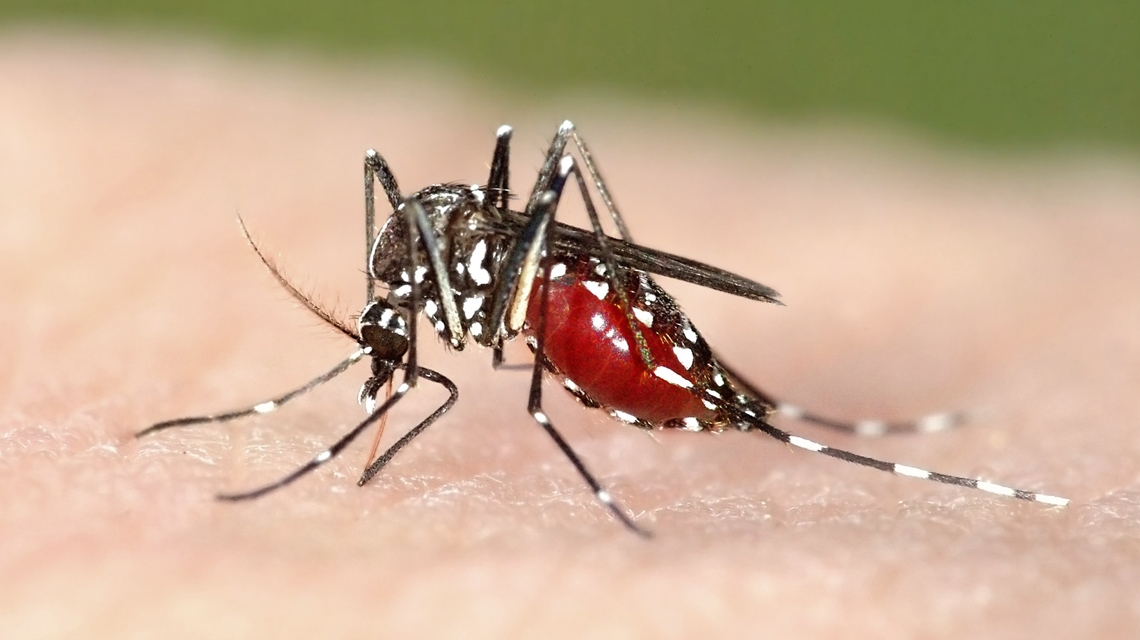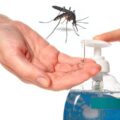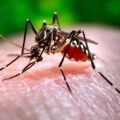According to the World Health Organization, Mosquitoes are one of the deadliest animals in the world. Their ability to carry and spread disease to humans causes millions of deaths every year. The worldwide incidence of dengue has risen 30-fold in the past 30 years, and more countries are reporting their first outbreaks of the disease. Zika, dengue, chikungunya, and yellow fever are all transmitted to humans by the Aedes aegypti mosquito. More than half of the world’s population live in areas where this mosquito species is present. Sustained mosquito control efforts are important to prevent outbreaks from these diseases. There are several different types of mosquitoes and some have the ability to carry many different diseases. Click below to see which diseases are transmitted by the Aedes, Culex, and Anopheles mosquitoes.
Mosquitos range from being a nuisance to carriers of diseases such as malaria, West Nile, dengue, Zika, and more. There are many ways to get rid of mosquitoes, from insecticides to natural and organic options. If you’re not comfortable with bug zappers, you can attract natural mosquito predators. There are many ways to get rid of mosquitoes, but they aren’t all equally effective. This guide you’ll find tips on removing them from both your house and your yard.
Mosquito Basics
Before we get into the methods for eliminating these nuisances, let’s go over a few mosquito basics. There are over 3,000 species of mosquitoes, with roughly 200 species in the U.S. alone. It’s a common misconception that mosquitoes suck blood for food. They’re not technically parasites, because they only suck blood to nourish their bodies so they can lay and hatch healthy eggs. Mosquitoes can lay 100 eggs at a time, so populations of this pest can get out of control quickly. When eliminating mosquitoes, it’s key to use multiple methods, since not all approaches kill every stage of the life cycle. Mosquitoes lay their hardy eggs in standing water, such as ponds and buckets.
It’s also important to note that repelling and killing mosquitoes aren’t the same thing. Repelling mosquitoes will keep them away from you by making you less attractive to them (they’re attracted to the carbon dioxide from our breath, elements of our sweat, and maybe even beer, according to some studies).
Killing mosquitoes may seem like a tempting option, but it’s not always in our—or the environment’s—best interest. That’s because mosquitoes can become resistant to pesticides, making them harder to kill overall. Killing mosquitoes can also be toxic to the environment, depending on the pesticide, and can mess up the natural ecosystem, since animals like birds and bats eat mosquitoes. SEE: Does Hand Sanitizer Repel Mosquitoes
The Best Way to Get Rid of Mosquitoes in Your House
You’re more likely to have a mosquito issue in your yard than in your home itself, but having them buzzing around during bedtime can be frustrating. Mosquitoes buzzing around are easier to spot during the day than at night. If it’s getting late and you want to track them down before they can make a meal out of your skin, turn on a lamp, flashlight, or your smartphone, and wait for them to be attracted to the light. Here are the top ways to repel the mosquitoes:
Chemical repellent
Applying traditional chemical mosquito repellent will keep them from making a meal of you. You should check out products that contain 30 to 50% DEET—the gold standard ingredient for mosquito repellent. In the past, there were some concerns that DEET was not safe to use on human skin. But reviews done by the Environmental Protection Agency have found that DEET continues to meet safety standards when used properly. The effects of DEET typically last for up to 12 hours. Experts recommend using a repellent that’s 30-50% DEET for adults, and 10-30% for children for children over two months. Do not spray repellent on infants under two months.
Fix any gaps
The first step is patching any gaps in screens and doors. It won’t do any good if you go through a careful process to rid your home of mosquitoes just to invite them in again. If you can see sunlight in the space around your door, that means it isn’t properly sealed. There’s an easy fix—purchase a simple door strip.
Mosquito netting
If you’re someone who likes to sleep with the windows open at night, consider getting some mosquito netting to keep yourself bite-free.
Mosquito traps
There are several ways you can get a mosquito trap—order one online, buy one from the grocery store or hardware store, or even make your own, DIY-style. To make your own, cut a bottle in half, flip one of the cut half upside down and tuck it in the lower half of the bottle.
Boil one cup of sugar and one cup of water, then add two cups of cool water. Let the mixture cool to about 90 degrees Fahrenheit. Add in a teaspoon of active, dry yeast, then pour the mixture into the trap. Secure the trap with tape. The mosquitoes will be attracted to the sugar, get stuck, and drown. You’ll need to replace your homemade solution periodically.
Oscillating fans
Mosquitoes can’t fly well against the wind. This may sound overly simple, but sometimes, simple is what you need. Turn your fan on and watch the mosquitoes scatter and ultimately give up.
Outdoor soap
Some outdoor soaps are specially designed to repel mosquitoes. After you bathe with 100% natural, non-toxic soap like Skin Armour Deep Woods Outdoor soap, the scent of your sweat won’t bother you, but it will repel mosquitoes.
Essential oils
Essential oils are said to repel mosquitoes, but they may not be as effective as traditional pesticides. Your best bet is an essential oil that contains lavender or oil of lemon eucalyptus. Other options include lemongrass, peppermint, cloves, and tee tree. Preparation is simple. Simply mix a few drops of your chosen essential oil with one cup of water, pour it into a spray bottle, shake it up, and you’re done. You can spray it on your bare skin and around your home, being careful not to spray it on any delicate fabrics.
Coconut oil and neem oil
A combination of coconut oil and neem oil, mixed together well with water, can repel mosquitoes for up to half a day. Spray it on your skin as a natural repellent.
Candles
Burning lavender candles, or well-known citronella, will keep mosquitoes away, since they can’t stand the scent.
Garlic
You can follow the essential oil spray process using garlic instead, though it won’t smell as sweet. Many people prefer the scent of eucalyptus to garlic in large doses.
Camphor
Camphor is a versatile repellent. You can either leave tablets in your room and let them evaporate, or, more effectively, burn some camphor in the room. Close all doors and windows and leave it burning for about 20 minutes. You’ll have to be outside the room, but supervise from a window. You may hate the smell as much as mosquitoes do.
Coffee grounds
Simply burn some coffee grounds in a coffee tray or egg carton, and trust the smoke to repel these pests. Do this carefully in an area where it won’t cause damage or set off a fire alarm.
Sage and rosemary
Burning sage and rosemary may smell delightful and soothing to you, but mosquitoes hate the scent and will steer clear.
Basil
Basil is a multi-use mosquito repellent. You can place a plant on your windowsill to keep mosquitoes at bay, or even use it as a topical oil and apply it to your skin.
Lemon balm
Applying lemon balm directly to the skin, especially sensitive areas like ankles and wrists, has been shown to be effective. Simply crush it up and rub it on your skin.
Listerine
Listerine mouth wash may sound random, but some people swear by it. Listerine contains eucalyptus oil. Apply it to your skin, smell minty fresh, and enjoy your mosquito-free existence.
Bug zappers
Bug zapper rackets may mean instant gratification, killing mosquitoes on contact, this method can get tiring if done over and over. Also, be mindful not to zap harmless insects.
The Best Way to Get Rid of Mosquitoes In Your Yard
Now, you’re safe from mosquitos in your home. But you don’t want to step in your backyard to a swarm of mosquitos.
Chemical repellents
Applying a chemical insect repellent designed for the outdoors is a solid way to get rid of mosquitoes. Repellents like Off! Bug Control Backyard Pretreat can protect the perimeters of lawns, backyards, and gardens for up to eight weeks. You can also spray a traditional, safe repellent on your skin. Picaridin is another option, a synthesized pepper plant ingredient, which lasts for up to 14 hours.
Permethrin is an active ingredient in chemical repellents that should never be used on skin, but can be incredibly handy if applied to camping gear, clothing, and shoes. Unlike DEET, which only repels mosquitoes, products with permethrin will kill mosquitoes on contact. Unfortunately, it can irritate skin, and kill beneficial insects like bees.
Mosquito traps
Mosquito traps are a handy way to control your mosquito population. These traps trick mosquitoes into flying into them by emulating the visual and smell stimuli that attract mosquitoes to humans. There are many varieties of mosquito traps out there. Some work by trapping mosquitoes to a sticky surface, while others electrocute them with an electric grid. The Mosquito Magnet is one of the most popular traps—it works by vacuuming mosquitoes up.
For this method, place your traps in a shady area. You may have to move them around to find the optimal placement for ensnaring mosquitoes. It’s worth noting that different species of mosquitoes react differently to traps, so it’s not a one-size-fits-all remedy.
Bug zappers
Zappers work by electrocuting mosquitoes. This method can help you fry a few of these annoying insects, but overall, it’s inefficient and comes with its risk—you may end up killing beneficial and harmless bugs.
Eliminate standing water
Adult mosquitoes lay their eggs in standing water, and that’s where their larvae hatch. Empty all stagnant bodies of water you can, like any water that’s pooled in buckets, gutters, ditches, and pet bowls. Make sure to refresh the water in any bird baths and check to see if your potted plants have enough drainage.
Treat pools and ponds
For standing water that you can’t eliminate, treat. Apply a larvicide dunk or liquid larvicide and run the filter regularly. To prevent mosquitoes from laying eggs in your pool, be sure to cover the pool at night and months when you aren’t using it.
There’s also a natural alternative. BTI, a naturally occurring bacterium found in soil, produces toxins that target and kill mosquito larvae. You can spray it over water like ponds, flower pots, and bird baths. It’s non-toxic to humans.
Burn candles
Citronella candles are a long-time fan favorite for repelling mosquitoes. You can buy sizable ones to place around your yard and ensure mosquitoes will keep their distance.
Thermacell
These handy devices are spray-free, emitting a no-mess repellent in a compact container. Completely scent-free, these easy-to-use containers are easy to refill and provide up to 15 feet of protection.
Oscillating fan
This is the sample principle as a fan indoors, but you probably have room for a larger, higher-power fan in your yard than in your living room.
Keep your yard trim and tidy
Mosquitoes like to rest and settle in areas that are cool, damp, and dark. Manicure your lawn, trim trees and shrubs, and make sure your grass isn’t getting too tall. This will make your yard less hospitable to mosquitoes.
Plant natural deterrents
Repelling mosquitoes doesn’t have to be just practical—it can be pretty, too. Planting natural deterrents can spruce up your garden while keeping these prevalent pests away. The following flora will keep mosquitoes away:
- Tulsi
- Lavender
- Marigolds
- Lemon balm
- Lemongrass
- Citronella
- Catnip
- Basil
- Garlic
- Peppermint
- Rosemary
- Pennyroyal
- Geraniums
- Sage
- Cedar mulch
Cedar oil is a common mosquito repellent ingredient. Cedar mulch soaks up excess moisture, keeping it in the soil and deterring mosquitoes from settling in your vegetation.
Natural predators
Predators can’t completely eradicate your issue if you’re overrun with mosquitoes, but if you’re just getting a few unwanted critters here and there, attracting them is worth a shot. Many birds are natural mosquito predators, including purple martins, waterfowl, swallows, and migratory songbirds. Setting up bird feeders is a solid step in attracting these birds.
If you have a pond, you can benefit from predators like goldfish, koi and red-eared slider turtles. Mosquitoes also fall prey to other insects—some you’d be happy to see in your garden and others, not so much. Spiders eat mosquitoes when they fly into their webs. Dragonflies gobble mosquitoes right up, and they’re drawn to white yarrow, meadow sage, and black-eyed Susan flowers.
Yellow LED lighting
Mosquitoes are attracted to the light from traditional light bulbs. Warm, yellow LED lights are less appealing to them, according to the American Association for the Advancement of Science.
Best Insecticide In Nigeria
- Rambo Magic insecticide
This insecticide is really wonderful if get the original of it, Rambo magic insecticide is the best insecticide in Nigeria that eliminate mosquitoes in just few minutes of use. Outside mosquitoes this insecticide work perfectly well in getting rid of other insects such as spiders, cockroach, ants etc. The smell is little friendly unlike some high dangerous insecticides. Rambo Magic is a the latest product of Rambo.
- Baygon Insecticide
Baygon is insecticide is one of the most popular insecticide in Nigeria. It is an insecticide used for extermination and control of household pests such as crickets, roaches, ants, carpenter ants, bedbugs, spiders, silverfish and mosquitoes. Baygon was introduced by the German chemical manufacturer Bayer in 1975. In 2003, Bayer sold the brand to S. C. Johnson & Son. As part of the agreement, the active ingredients used in the pesticides are still manufactured by Bayer and supplied non-exclusively to SC Johnson. Baygon products contain the pyrethroids cyfluthrin, transfluthrin, prallethrin and the carbamate propoxur and organophosphorus chlorpyrifos, as active ingredients. In the concentrations used in consumer product insecticides, pyrethroids may also have insect repellent properties and are generally harmless to human beings in low doses but can harm sensitive individuals.
- Raid Insecticide
Raid insecticide is one of the oldest insecticide if not the oldest, Raid has been for a long while now still ranking a maximum insects killing potential. This insecticide work perfectly well killing all insects according to it promise, the smell of raid is not friendly but it work perfectly.
- Rambo Insecticide
While Rambo Magic made the best Nigeria insecticide it a bit sad the main and first Rambo insecticide could not make it at second position even. Rambo is among the oldest best insecticides in Nigeria that has serve the country greatly in means of eliminating insects. Rambo is perfect killing insecticide that keep killing for long, the smell might not be too friendly but it work perfectly well according to it promise.
- Mobil insecticide
Mobil insecticide is among the best and oldest Nigeria insecticides, this insecticides is considered for fast killing of insect and continually killing for long. The smell is not friendly but it work perfectly ok in killing insects.
Warning
There are some dangerous risk involve using certain chemical like Sniper insecticide for killing mosquitoes as they are not only harmful to the body they can also kill the occupants of such houses or rooms where they are used. Sniper is a DDVP, 2,2-Dichlorovinyl dimethyl phosphate compound, marketed in Nigeria by Swiss-Nigerian Chemical Company, as a synthetic organophosphorus. Many Nigerians have, however, converted it to an indoor insecticide. This practice has led to the untimely deaths of many.





